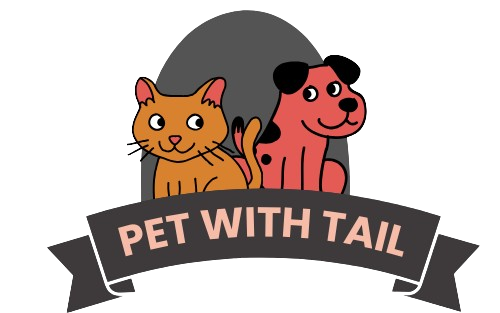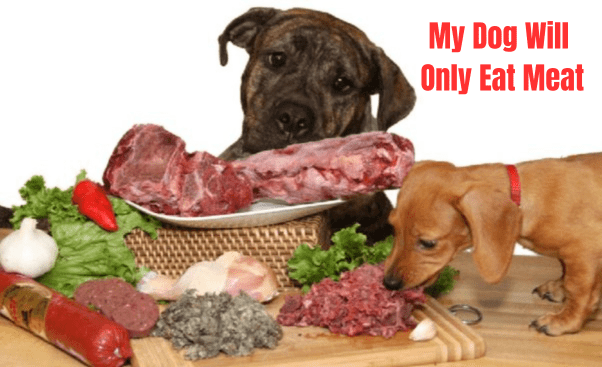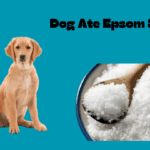Many dog owners wonder what kind of food is best for their pets. Some dogs are omnivorous and can eat a variety of foods, while others are more selective and have specific preferences. For example, my dog will only eat meat.
This poses some challenges and questions for me as a dog owner. In this essay, I will explore the reasons why my dog is a carnivore, the benefits and drawbacks of feeding him meat, and the alternatives that I can consider.
Contents
- 1 My Dog Will Only Eat Meat, Some Possible Reasons
- 2 Should I feed my dog meat only?
- 3 Can I feed organ meat to my dog?
- 4 What type of meat do I feed the dog?
- 5 Can dogs eat cooked meat every day?
- 6 How much meat should I feed my dog?
- 7 Can I give bones to my dog?
- 8 Conclusion
- 9 FAQs: My dog will only eat meat
My Dog Will Only Eat Meat, Some Possible Reasons
If you have a dog that will only eat meat, you might be wondering if this is normal or healthy for your furry friend. After all, dogs are omnivores, meaning they can eat both plant and animal foods. So why is your dog so picky about his diet?
There are many possible reasons why your dog will only eat meat, and some of them might require a visit to the vet. Here are some of the most common ones:
Medical issues
Your dog might have a health problem that makes him crave meat or avoid other foods. For example, he might have a dental issue that makes chewing painful, a digestive disorder that affects his appetite, or a nutrient deficiency that needs to be corrected.
If your dog shows any signs of illness, such as vomiting, diarrhea, weight loss, lethargy, or bad breath, you should take him to the vet as soon as possible.
Behavioral issues:
Your dog might have developed a habit of eating only meat because of his past experiences, preferences, or training. For example, he might have been fed only meat by his previous owner, he might prefer the taste and texture of meat over other foods, or he might have learned that he can get more attention or treats by being fussy.
If your dog is otherwise healthy and happy, this might not be a serious problem, but you might want to consult a dog trainer or behaviorist to help you change your eating habits.
Environmental issues
Your dog might be influenced by his surroundings or the people he lives with. For example, he might be stressed by a change in his routine, a new family member, or a noisy neighbor. He might also be copying the eating habits of another dog or human in the house. If your dog is affected by his environment, you should try to make him feel more comfortable and secure, and avoid rewarding his picky behavior with extra attention or treats.
Whatever the reason why your dog will only eat meat, you should know that this is not a balanced or healthy diet for him. Dogs need a variety of nutrients from different sources, including carbohydrates, fiber, vitamins, minerals, and water. Feeding your dog only meat can lead to serious health problems, such as obesity, diabetes, kidney failure, pancreatitis, and bone disorders.
Therefore, you should try to introduce other foods to your dog’s diet, such as vegetables, fruits, grains, eggs, dairy, and fish. You can do this gradually, by mixing small amounts of new foods with his meat and increasing the proportion over time. You can also try different flavors, textures, and temperatures, to see what your dog likes best. You can also use positive reinforcement, such as praise, toys, or play, to encourage your dog to try new foods.
However, you should not force your dog to eat something he does not want, or punish him for being picky. This can make him more resistant and stressed, and damage your relationship with him. You should also not give him human foods that are toxic or harmful to dogs, such as chocolate, grapes, onions, garlic, or xylitol.
If your dog still refuses to eat anything but meat, or if you have any concerns about his health or behavior, you should consult your vet for professional advice. Your vet can examine your dog, run some tests, and prescribe a suitable diet or medication for him. Your vet can also refer you to a dog nutritionist, who can design a customized meal plan for your dog, based on his age, weight, activity level, and health condition.
Remember, your dog will only eat meat because he thinks it is the best option for him, not because he wants to annoy you or make you worry. By understanding the reasons behind his behavior, and providing him with a balanced and varied diet, you can help him live a longer, happier, and healthier life.
Suggested: Can Dogs Eat Cardamom?
Does Chicken and Rice Cause Constipation In Dogs?
Should I feed my dog meat only?
The answer is no, you should not feed your dog meat only. Dogs are omnivores, meaning they can eat both plant and animal foods. They need a balanced diet that provides them with all the essential nutrients they need, such as carbohydrates, fiber, vitamins, minerals, and water.
Feeding your dog meat only can lead to serious health problems, such as obesity, diabetes, kidney failure, pancreatitis, and bone disorders. Therefore, you should include other foods in your dog’s diet, such as vegetables, fruits, grains, eggs, dairy, and fish.
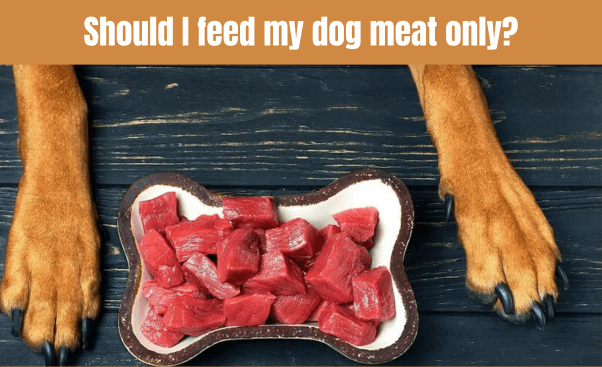
Can I feed organ meat to my dog?
Yes, you can feed organ meat to your dog, as long as it is fresh, clean, and cooked. Organ meat, such as liver, heart, kidney, and spleen, is rich in protein, iron, zinc, vitamin A, and vitamin B12. It can be a good source of nutrients for your dog, especially if he has a deficiency or a health condition that requires more of these nutrients.
However, you should not feed organ meat to your dog too often, as it can also contain high levels of cholesterol, fat, and toxins. You should limit the amount of organ meat to no more than 10% of your dog’s daily calories, and balance it with other foods.
What type of meat do I feed the dog?
You can feed your dog different types of meat, such as chicken, beef, lamb, turkey, pork, and fish. However, you should make sure that the meat is lean, boneless, and skinless, and that it is cooked thoroughly to kill any bacteria or parasites.
You should also avoid feeding your dog any processed meats, such as bacon, ham, sausage, or salami, as they can contain high levels of salt, preservatives, and additives that can harm your dog’s health. You should also avoid feeding your dog any raw meat, as it can pose a risk of infection, contamination, or choking.
Can dogs eat cooked meat every day?
Yes, dogs can eat cooked meat every day, as long as it is not the only food they eat. Meat is a good source of protein, which is essential for your dog’s growth, development, and maintenance. However, meat alone cannot provide your dog with all the other nutrients he needs, such as carbohydrates, fiber, vitamins, minerals, and water.
Therefore, you should also feed your dog other foods, such as vegetables, fruits, grains, eggs, dairy, and fish, to ensure a balanced and varied diet. You should also monitor your dog’s weight, as too much meat can lead to obesity and other health problems.
How much meat should I feed my dog?
The amount of meat you should feed your dog depends on several factors, such as his age, weight, activity level, and health condition. As a general rule, you should feed your dog about 2-3% of his body weight in meat per day, divided into two or three meals.
For example, if your dog weighs 10 kg, you should feed him about 200-300 grams of meat per day. However, this is only a rough estimate, and you should adjust it according to your dog’s individual needs and preferences. You should also consult your vet for a more accurate and personalized recommendation.
Can I give bones to my dog?
No, you should not give bones to your dog, as they can be very dangerous for him. Bones can splinter, crack, or break, and cause serious injuries to your dog’s mouth, throat, stomach, or intestines. They can also get stuck in your dog’s teeth, gums, or esophagus, and cause pain, infection, or choking.
Bones can also be a choking hazard, especially for small or greedy dogs, who might swallow them whole or in large pieces. Therefore, you should avoid giving your dog any bones, whether they are cooked or raw, and opt for safer alternatives, such as dental chews, rubber toys, or rawhide.
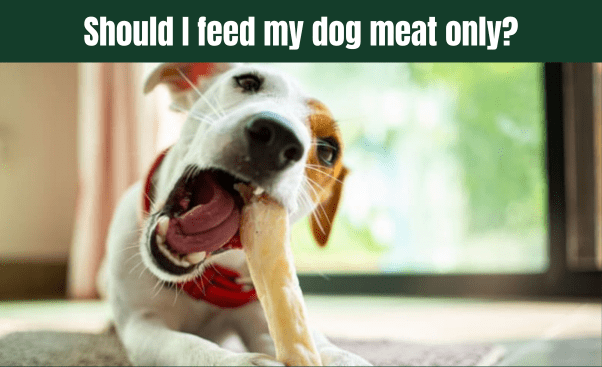
Conclusion
while it may seem convenient to cater to a dog’s preference for my dog will only eat meat, feeding them a diet exclusively composed of meat poses significant health risks. Dogs require a balanced diet that includes various nutrients from different sources to maintain optimal health.
A meat-only diet can lead to serious issues such as obesity, diabetes, kidney failure, pancreatitis, and bone disorders. It’s essential to introduce a variety of foods like vegetables, fruits, grains, eggs, dairy, and fish gradually into their diet to ensure they receive all necessary nutrients.
Consulting with a veterinarian and possibly a dog nutritionist can help design a suitable meal plan tailored to your dog’s specific needs. By providing a balanced and varied diet, you can help your furry friend live a longer, happier, and healthier life.
FAQs: My dog will only eat meat
Q: Is it OK if my dog only eats meat?
A: No, it is not OK if your dog only eats meat. Dogs are omnivores, meaning they can eat both plant and animal foods. They need a balanced diet that provides them with all the essential nutrients they need, such as carbohydrates, fiber, vitamins, minerals, and water. Feeding your dog meat only can lead to serious health problems, such as obesity, diabetes, kidney failure, pancreatitis, and bone disorders. Therefore, you should include other foods in your dog’s diet, such as vegetables, fruits, grains, eggs, dairy, and fish.
Q: Why won’t my dog eat dog food but will eat human food?
A: There are many possible reasons why your dog won’t eat dog food but will eat human food. Some of them are:
- Your dog might have a medical issue that affects his appetite or taste buds. For example, he might have a dental problem, a digestive disorder, or an allergy. If your dog shows any signs of illness, such as vomiting, diarrhea, weight loss, lethargy, or bad breath, you should take him to the vet as soon as possible.
- Your dog might have a behavioral issue that makes him prefer human food over dog food. For example, he might have been fed human food by his previous owner, he might associate human food with positive emotions, or he might have learned that he can get more attention or treats by being picky. If your dog is otherwise healthy and happy, this might not be a serious problem, but you might want to consult a dog trainer or behaviorist to help you change your eating habits.
- Your dog might be influenced by his environment or the people he lives with. For example, he might be bored, stressed, or anxious by a change in his routine, a new family member, or a noisy neighbor. He might also be copying the eating habits of another dog or human in the house. If your dog is affected by his environment, you should try to make him feel more comfortable and secure, and avoid rewarding his picky behavior with extra attention or treats.
Whatever the reason why your dog won’t eat dog food but will eat human food, you should know that human food is not always suitable or safe for dogs. Some human foods can be toxic or harmful to dogs, such as chocolate, grapes, onions, garlic, or xylitol. Some human foods can also be too high in calories, fat, salt, or sugar for dogs, and cause obesity, diabetes, or other health problems. Therefore, you should feed your dog high-quality dog food that meets his nutritional needs, and limit the amount of human food you give him as occasional treats.
Q: Can I feed my dog a vegan diet?
A: The answer to this question is not very clear, as there is not enough scientific evidence or consensus on the effects of a vegan diet on dogs. Some experts argue that dogs can thrive on a vegan diet, as long as it is well-planned and supplemented with the necessary nutrients, such as protein, amino acids, vitamins, and minerals. Some experts claim that a vegan diet can benefit dogs with certain health conditions, such as allergies, skin problems, or digestive issues. Some experts also point out the ethical and environmental advantages of a vegan diet, as it can reduce animal suffering and greenhouse gas emissions.
However, some experts warn that a vegan diet can be risky or harmful for dogs, as it can cause nutritional deficiencies, imbalances, or complications. Some experts doubt that dogs can digest and absorb plant-based foods as well as animal-based foods, as they have a shorter and simpler digestive system than humans. Some experts also emphasize the natural and evolutionary history of dogs as carnivores and suggest that a vegan diet can go against their instincts and preferences.
Therefore, if you are considering feeding your dog a vegan diet, you should do so with caution and under the guidance of your vet. You should also monitor your dog’s health and behavior closely, and look for any signs of improvement or deterioration. You should also respect your dog’s choice and well-being, and not force him to eat something he does not want or enjoy.
